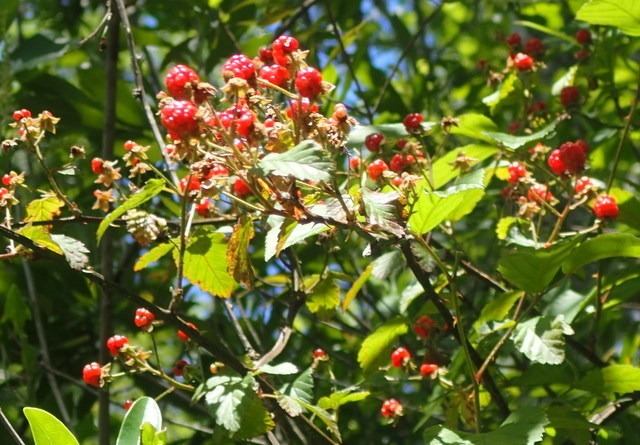Pennsylvania Blackberry
(Rubus ×pensilvanicus)
Pennsylvania Blackberry (Rubus ×pensilvanicus)
/
/

mfeaver
CC BY 4.0
Image By:
mfeaver
Recorded By:
Copyright:
CC BY 4.0
Copyright Notice:
Photo by: mfeaver | License Type: CC BY 4.0 | License URL: http://creativecommons.org/licenses/by/4.0/ | Rights Holder: mfeaver | Publisher: iNaturalist | Date Created: 2021-05-23T13:19:53-07:00 |

















































Estimated Native Range
Summary
Rubus ×pensilvanicus, commonly known as Pennsylvania Blackberry, is a deciduous subshrub native to a variety of habitats including open woodlands, forest edges, and thickets across the Eastern United States and Canada. It can grow up to 3 meters (10 feet) tall, and its canes, which are initially green, turn to a dark red as they mature. These canes are typically ridged and armed with numerous straight prickles. The foliage consists of palmately compound leaves with 5 to 7 leaflets, and the plant produces showy white flowers with large petals in mid-spring. Following the flowering period, the plant bears large, sweet fruits that are aggregates of 10-100 black drupelets, commonly harvested for jams and jellies.
Pennsylvania Blackberry is valued for its edible fruits and as a wildlife attractant, providing food for birds and other animals. It is often used in naturalized areas, as well as in fruit gardens for its bountiful harvest. This subshrub thrives in full sun but can tolerate partial shade, and it is adaptable to a range of soil types, provided they have good drainage. While it is generally easy to maintain, it can become invasive if not managed properly, spreading through its vigorous root system and self-seeding. Gardeners should be cautious of its prickly canes when handling or planting.CC BY-SA 4.0
Pennsylvania Blackberry is valued for its edible fruits and as a wildlife attractant, providing food for birds and other animals. It is often used in naturalized areas, as well as in fruit gardens for its bountiful harvest. This subshrub thrives in full sun but can tolerate partial shade, and it is adaptable to a range of soil types, provided they have good drainage. While it is generally easy to maintain, it can become invasive if not managed properly, spreading through its vigorous root system and self-seeding. Gardeners should be cautious of its prickly canes when handling or planting.CC BY-SA 4.0
Plant Description
- Plant Type: Shrub
- Height: 2-5 feet
- Width: 4-6 feet
- Growth Rate: Moderate
- Flower Color: White
- Flowering Season: Spring, Summer
- Leaf Retention: Deciduous
Growth Requirements
- Sun: Full Sun, Part Shade
- Water: Medium
- Drainage: Slow, Medium, Fast
Common Uses
Bee Garden, Bird Garden, Butterfly Garden, Edible*Disclaimer: Easyscape's listed plant edibility is for informational use. Always verify the safety and proper identification of any plant before consumption., Groundcover, Hummingbird Garden
Natural Habitat
Native to open woodlands, forest edges, and thickets across the Eastern United States and Canada
Other Names
Common Names: Pennsylvania Raspberry, Ronce De Pennsylvanie
Scientific Names: , Rubus ×pensilvanicus, Rubus ×floricomus, Rubus ×orarius, Rubus abactus, Rubus ×avipes,
GBIF Accepted Name: Rubus ×pensilvanicus Poir.